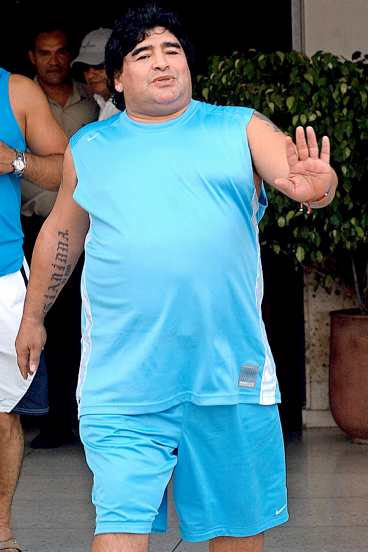Maradona was an artist who inspired the mystical. Like Zidane after him, Maradona fuelled myths in the zealous minds of his followers and the collective psyche of his country. But he was too good for his own good. A soccer genius, Maradona rose from the slums of Buenos Aires to become an icon and an idol in the Catholic lands of Argentina and Italy. Author of the infamous Hand of God goal that he punched into the English net in Mexico ‘86, most of his goals were end-to-end rushes. He was like watching Bobby Orr in short-shorts and a pair of Adidas.
But Maradona was given to excess. Derailed multiple times for cocaine violations, and banned from the 1994 World Cup due to an ephedrine-tainted urine sample, Maradona fell off the world stage in tragic fashion. Despite his collapse, Maradona has remained in the Latin American spotlight well into his retirement; whether as a clown, as a talking head, or as a tribal god is unclear.
For those who don’t know the story of his rise and fall, it goes something like this. Born in the Buenos Aires shantytown of Villa Fiorito in 1960, Diego Armando Maradona grew up in piss-poor poverty. His family’s destitution was extreme, a fact that made Diego’s rise to superstardom one of the greatest rags-to-riches stories of all time.
One of the more notorious tales from his youth recalls the grim day that Diego lost his way at home one evening after dark. Struggling to find his way through the hallway, Diego stumbled and fell into a cesspit that served as the family toilet. As legend has it, Maradona’s uncle Cirilo was nearby, and while coming to Diego’s rescue, Uncle Cirilo shouted out, “Diegito, keep your head above the shit!”. Diegito was indeed saved, but it’s not exactly the stuff of Catholic baptism.
Despite the rather putrid omen, family friend Jose Trotte described the young Diego in these terms: “He was not educated, he had no sophistication. He was shirtless and barefooted. He was just this street kid with a gift from God.” The “gift from God”, of course, was Maradona’s golden ticket out of the slum. It was also his family’s ticket out of the slum. And it was Argentina’s ticket to the promised land. It was an immense mountain of pressure, to be sure, but Maradona was made for the stage. Throughout the 80s, Maradona performed brilliantly on every new stage that came his way. He was charismatic, passionate, and full of coke-summoned energy.
For about a decade, the idea of Maradona’s predestination was a compelling myth. But like a lottery winner, he was unable to deal with his sudden rise in social standing. Much of his private time in Italy was spent in public, as he cavorted with prostitutes, while consuming gluttonous amounts of cocaine.
Indeed, one of the most remarkable aspects of Maradona’s bipolar story is the fact that he was a raging cokehead during the peak of his soccer career. Introduced to cocaine while in Barcelona, Maradona became an addict in Napoli, a small market team he led to two Italian Championships. But what else should you expect from a bull-headed prima donna straight out of the slums? Especially when he trumps the Pope in social importance? Naturally, the Napoli tifosi treated Maradona like a god. So Maradona behaved in turn like a drug-addled rock star.
Despite the cocaine, Maradona’s legend grew. In 1986, at the peak of his coke consumption, he was also at the summit of his soccer status. That year, he scored 5 brilliant goals and set up 5 others in leading a mediocre Argentine squad on a scintillating run to the World Cup. His miraculous performance also cemented his reign as the greatest footballer in the world.
By the end of the 80s, however, Maradona’s greatness was in decline, and the drug tests started coming back positive. In 1990, there was another World Cup Final, but Argentina lost, and it was clear that Maradona’s magic had vanished. Then, in 1991, he tested positive for cocaine and was suspended for 15 months. But the tribulation was only beginning. Two games into the 1994 World Cup, he tested positive for ephedrine, and was banned from the competition. Then, in 1997, he again tested positive for cocaine, and this third suspension basically signaled the end of an illustrious roller-coaster career.
Of course, one of the consequences of unanimous praise is that there is never a middle ground to help moderate the supernatural treatment you receive. With very little transition time to adjust to new realities, Maradona went from being dirt poor to filthy rich; then he turned from a street urchin into a mortal god.
But after living like a decadent rock star during that vital period of a man’s development when he learns what he can’t afford to do, Maradona could always afford to play the fool. After all, there is a certain level of superstar who is expected to live the life of never-ending excess. We welcome a god’s fatal flaw like a good tragicomedy, laughing when it’s convenient, and shaking our heads in paternal disbelief when the man comes crashing down. In Maradona’s case, he fell from glory like a fat man doing a belly-flop.
Given the roller-coaster life he has led, it is of course easy to point the finger at Maradona and call him Icarus. As part of his crash-and-burn, a morbidly obese version of Diego Maradona suffered a cocaine-induced heart attack that left him recuperating in a Buenos Aires hospital. But Argentina did not treat him as a scapegoat who had disgraced his people. Instead, pilgrims traveled from distant lands to pay homage to their gargantuan hero.





